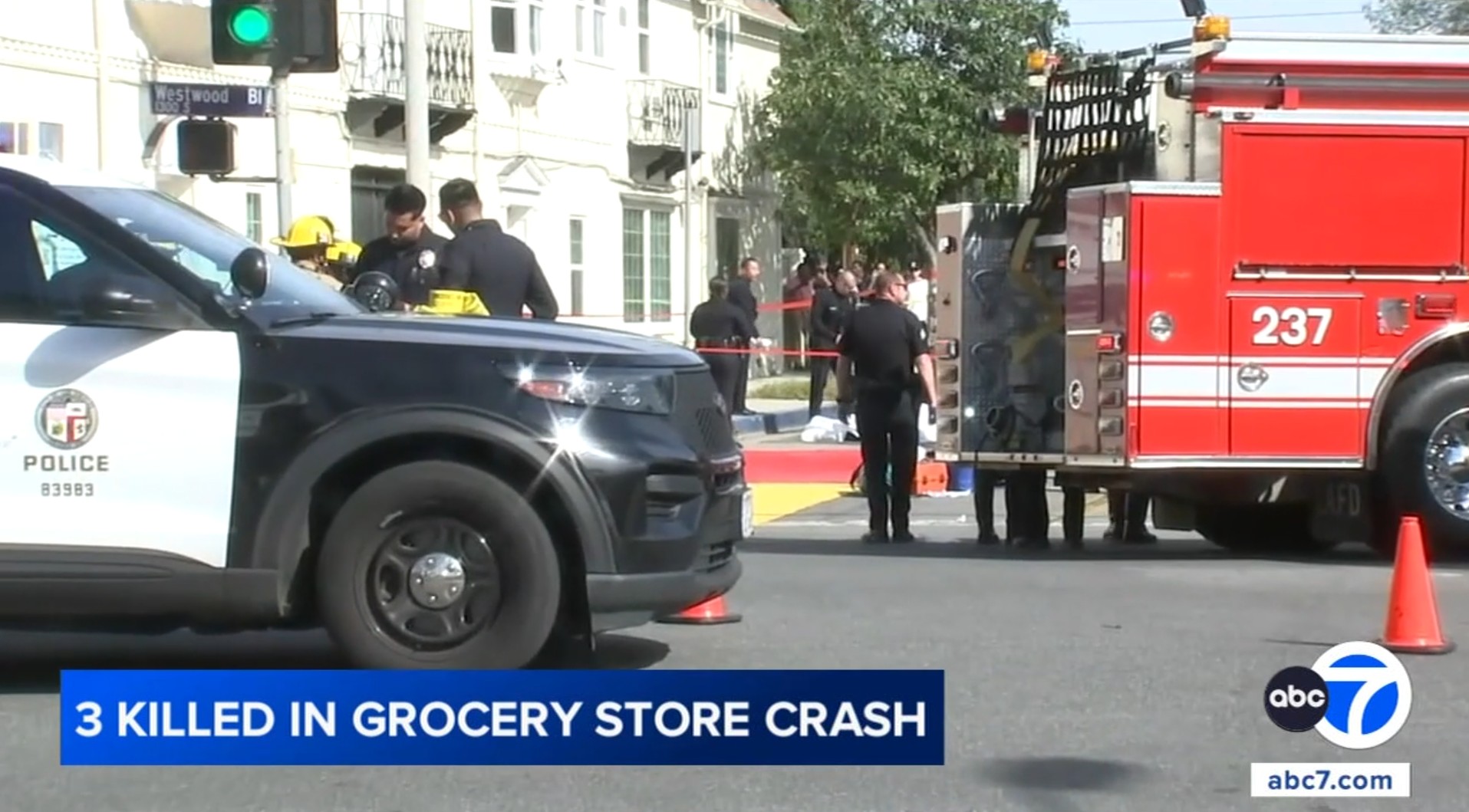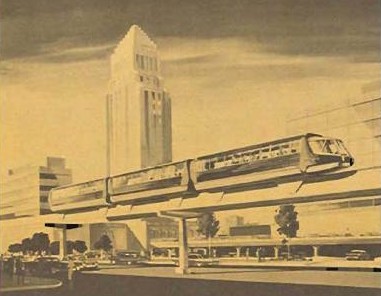 Former Mayor Richard Riordan presents training wheels to the wounded Mayor. For more pics from the conference, visist Gary Rides Bikes' Flickr Page
Former Mayor Richard Riordan presents training wheels to the wounded Mayor. For more pics from the conference, visist Gary Rides Bikes' Flickr PageDespite the Monday 9am hour and the picture perfect weather, a
standing-room only crowd assembled in the Metro Board Room for city of
Los Angeles Mayor Antonio Villaraigosa's first Bike Summit. Alongside
Mayor Villaraigosa were Department of Transportation (LADOT) General
Manager Rita Robinson, Metro CEO Art Leahy, Department of City Planning
(DCP) General Manager Michael LoGrande, and Police Department Deputy
Chief Kirk Albanese sitting in for Chief Charlie Beck.
Kicking off the summit was a visit from former Mayor and recreational
cyclist Richard Riordan and longtime former Bicycle Advisory Committee
chair Alex Baum, presenting the current mayor with a set of training
wheels as a gift from Lance Armstrong.
After brief remarks from the mayor, the meeting format quickly boiled
down to about a hundred cyclists speaking for one minute each. This
format is familiar to seasoned bicycle activists, but was unclear to a
few cyclist speakers who expressed that it was indeed their first public
hearing.
Attendees included a veritable who's who of Los Angeles' bicycling
community. Included were representatives from the city's Bicycle
Advisory Committee (BAC), BikeSide, Los Angeles County Bicycle Coalition
(LACBC), International Mountain Biking Association (IMBA), Bicycle
Kitchen, CicLAvia, Concerned Off Road Bicyclists Association (CORBA),
and many many others. Putting in an impassioned appearance was Los
Angeles City Council Member Bill Rosendahl - chair of the Council's
Transportation Committee.
Overall the mood was very upbeat, with cyclists expressing a great
deal of gratitude to the Mayor for convening the summit and addressing
bicyclists' concerns. Public comment topics ranged from cyclocross to
potholes to obesity to resurfacing to the cruelty of biking with
restrained pets. This article doesn't attempt to catalog all the
concerns raised by cyclists, but focuses primarily on the Mayor's
reactions and stated commitments.
Mayor Villaraigosa initially expressed his past support for Los
Angeles cyclists based on his leadership in setting aside 10% of the
city's Measure R transportation sales tax "local return" funding. This
funding is expected to total $19M over the next five years, and will go
to both bicycle and pedestrian projects. The mayor pledged to use this
money as leverage in seeking additional Metro bicycle project
funding. He also committed to improve cyclist access to Metro rail and
to complete bikeways in conjunction with Metro's future Expo Line and
Orange Line extension.
The strongest recurring theme in the mayor's remarks was support for
bike helmets. Villaraigosa frequently recounted details of his recent
car-bike incident. Avoiding colliding with the taxi, he fell from his
bike, initially hitting the ground with his helmet-protected head. His
elbow struck next and was "shattered in so many places" that it "swelled
to the size of a grapefruit." His physicians stated that its severity
more resembled a motorcycle injury, then a bicycling one. The
mayor spoke with deep conviction that his helmet had likely saved his
life. Initially he pledged to appear in a public service announcement
to encourage riders to always wear a helmet.
As the meeting proceeded, Villaraigosa's helmet support grew
stronger. To the audible dismay of many cyclists present, he further
ardently pledged to push for a statewide mandatory bicycle helmet law - a
controversial subject. (Helmets are not required for driving or walking
- both activities arguably with similar or greater injury risk than
that of bicycling. Bicycle helmet requirements also tend to result
in less bicycling, hence inadvertently result in less "safety in
numbers" and overall decreased physical activity and public
health.) The mayor's helmet mandate support was most articulately
criticized in the comments of cyclist Road Block, who pointed out that
nobody wears helmet in European cycling capitals including Copenhagen,
and that a better focus would be to create safer streets.
Though strong, clear and steadfast on helmet issues, the mayor was
more hesitant with other pledges. At times, Villaraigosa paused
indecisively over his words, apparently not accustomed to speaking about
bicycle issues. Similarly, LADOT GM Rita Robinson, who often speaks
persuasively on budgetary issues, faltered in trying to describe what
bike projects her department was implementing. (The mayor subsequently
pledged to make a bike project listing with scheduled dates available
online.) While these officials appear genuine in their support for
stepping up the city's commitment to bikes, they just don't quite sound
well-versed in the issues that bicyclists face... yet.
Robinson did commit to staffing levels necessary for implementing the
city's pending Bike Plan, which DCP GM LoGrande pledged to fully
release soon. The mayor stated that his first response the city's
pending new Bike Plan was "30 years?" - expressing disbelief that it
would take the city so long to become truly safe for cycling.
The mayor expressed "frustration" over the "bureaucracy" in the
city's plan to hosting CicLAvia - a car-free event modeled after similar
events the mayor enjoyed in Guadalajara, Mexico. Councilmember
Rosendahl went one further in expressing that he was "embarrassed" when
he compares Los Angeles' progress to that made by other cities,
including Long Beach.
Cyclists wished the mayor a speedy recovery, hoping that he will be
back up on his bike long before he convenes his future bike summits on
"at least a yearly basis."






